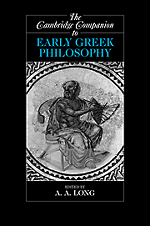Book contents
- Frontmatter
- 1 The scope of early Greek philosophy
- 2 Sources
- 3 The beginnings of cosmology
- 4 The Pythagorean tradition
- 5 Heraclitus
- 6 Parmenides and Melissus
- 7 Zeno
- 8 Empedocles and Anaxagoras
- 9 The atomists
- 10 Rational theology
- 11 Early interest in knowledge
- 12 Soul, sensation, and thought
- 13 Culpability, responsibility, cause
- 14 Rhetoric and relativism
- 15 Protagoras and Antiphon
- 16 The poetics of early Greek philosophy
- Bibliography
- Index
15 - Protagoras and Antiphon
Sophistic debates on justice
Published online by Cambridge University Press: 28 May 2006
- Frontmatter
- 1 The scope of early Greek philosophy
- 2 Sources
- 3 The beginnings of cosmology
- 4 The Pythagorean tradition
- 5 Heraclitus
- 6 Parmenides and Melissus
- 7 Zeno
- 8 Empedocles and Anaxagoras
- 9 The atomists
- 10 Rational theology
- 11 Early interest in knowledge
- 12 Soul, sensation, and thought
- 13 Culpability, responsibility, cause
- 14 Rhetoric and relativism
- 15 Protagoras and Antiphon
- 16 The poetics of early Greek philosophy
- Bibliography
- Index
Summary
INTRODUCTION
Justice was a major topic of debate at Athens during the period that extends from Aeschylus' Eumenides (456 B.C.), with its celebration of the inauguration of the court of the Areopagus, down to the trial and death of Socrates (399 B.C.), memorialized in Plato's Apology. Historians, dramatists, orators, and philosophers provide a range of perspectives and evidence on one of the crucial issues of the age. In the earliest Greek literature human justice had been very closely linked to divine justice and power, but in the fifth century, the time of tribunals and popular assemblies, what chiefly attracts attention is justice purely in the human sphere. Questions are raised about its origin, its connection with nature and truth, its performance, the conditions that can guarantee its development, and the forces that generate its opposite - coercive power, violence, and injustice.
In order to acquire a general idea of the terms in which these issues were explored at the end of the fifth century, it is enough to read the speeches Plato puts into the mouths of Glaucon and Adeimantus at the beginning of book two of his Republic. These speeches provide the best introduction to our theme because they exemplify the cultural background against which Plato develops his great project in this dialogue. Before turning to details, a few words are necessary on some of the questions that emerge in the preceding book.
- Type
- Chapter
- Information
- The Cambridge Companion to Early Greek Philosophy , pp. 311 - 331Publisher: Cambridge University PressPrint publication year: 1999
- 6
- Cited by



